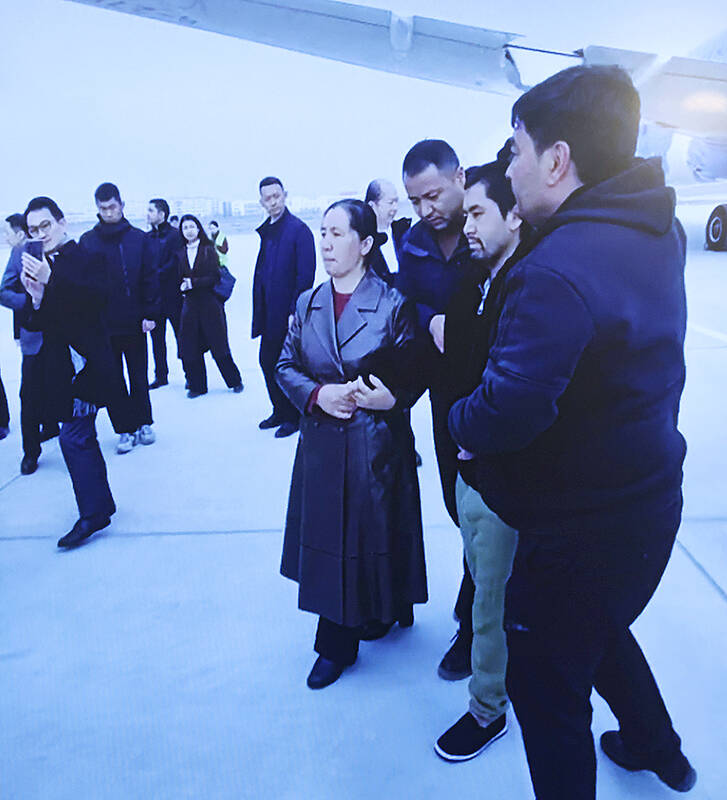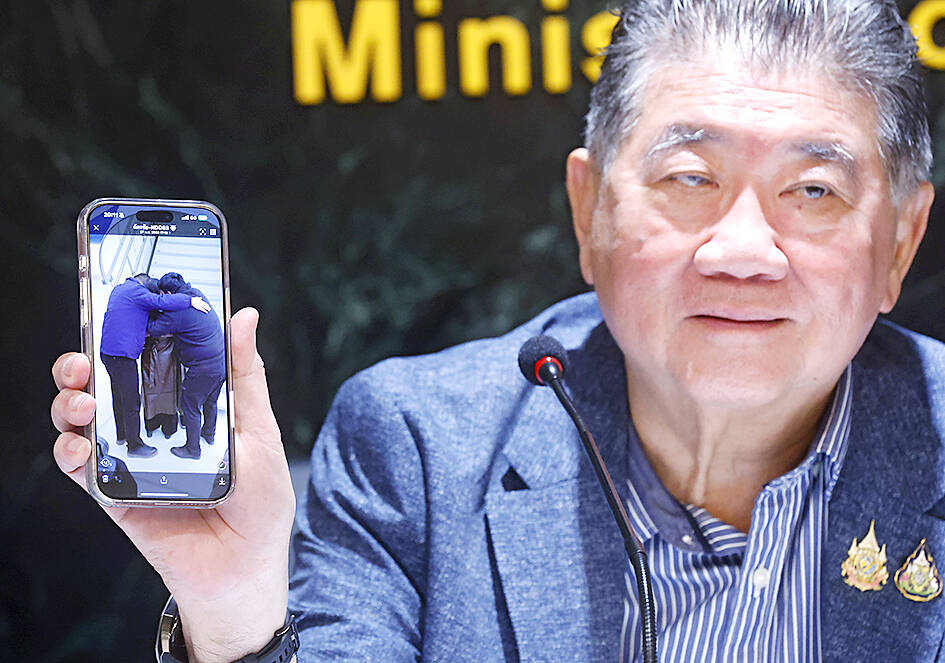Late last month, representatives of a Thai Muslim organization brought a reassuring message to 40 Uighur men terrified they were going to be sent back to China: The government had no immediate plans to deport them.
Less than 72 hours later, the men were on a plane bound for China’s far west Xinjiang region, where UN experts say they could face torture or other punishment.
Thailand decided to deport the men more than a month earlier, while denying plans to do so to the public, lawmakers and Muslim religious leaders until almost the very end, according to testimony from parliamentary inquiries, interviews, meeting notes and voice messages. That gave the detainees and their advocates no chance to make a last-ditch appeal before they were bundled off and sent back to China.

Photo: EPA-EFE
Now, the Thai government is dealing with the fallout of a move that outraged human right activists and allies. The decision is at the heart of Thai parliamentary inquiries and a diplomatic rift between Thailand and its biggest military ally. The US has imposed sanctions on multiple Thai officials while the EU and other allies issued condemnations.
Thai officials visited Xinjiang last week to meet some of the deported Uighurs and said they are being treated well. They have also said the men returned voluntarily, despite evidence to the contrary.
THAILAND’S DILEMMA

Photo: EPA-EFE
The Uighurs are a Turkic, majority Muslim ethnicity native to Xinjiang. After decades of conflict over suppression of their cultural identity, Beijing launched a brutal crackdown on the Uighurs that some Western governments deem a genocide.
The men deported last month were part of a larger group of Uighurs detained in Thailand in 2014 after fleeing China. That left Thailand facing competing demands from Beijing and Washington.
Beijing said the Uighurs were terrorists and wanted them sent back, but hasn’t presented evidence. Uighur activists and Western officials said the men are innocent and have urged their resettlement elsewhere.
Facing potential backlash from all sides, Thailand kept the men in detention for over a decade.
That changed when Thai Prime Minister Paetongtarn Shinawatra took office last year. Her father, former Prime Minister Thaksin Shinawatra, has close links to top Chinese officials.
Thai officials began secretly discussing plans to deport the Uighurs as early as December, a month after Paetongtarn met Chinese leader Xi Jinping (習近平), the AP earlier reported.
China sent a formal request to repatriate the Uighurs on Jan. 8, according to records of a parliamentary inquiry held after the men had been sent back and lawmaker Rangsiman Rome.
The same day, the men were asked to sign deportation papers, alarming them. They made a public appeal and went on a hunger strike, giving pause to Thai officials.
Nonetheless, on Jan. 17, the National Security Council decided behind closed doors to deport the Uighur detainees at a meeting attended by the ministers of defense and justice, the council’s Secretary-General Chatchai Bangchuad revealed to the parliamentary investigation. Chatchai said the decision was based in part on commitments from China that the men would be treated well and that Thailand would be allowed to check on them.
REPEATED DENIALS
That’s when the denials began.
Shortly after the Jan. 17 meeting, Defense Minister Phumtham Wechayachai told reporters the government had no immediate plans for deportation.
In a Jan. 29 parliamentary inquiry, the Thai government again denied plans to deport the men, according to the records of the meeting and an interview with Thai lawmaker Kannavee Suebsang.
Thai Senator Angkhana Neelapaijit said the justice minister told her personally there were no plans to send the men to China just a week before they were deported.
The Ministry of Justice referred the AP to the Ministry of Foreign Affairs for comment. The foreign ministry declined to comment.
In a Feb. 24 meeting, representatives of Sheikhul Islam, an official Islamic organization close to the Thai authorities, told the Uighurs the government said they wouldn’t be sent to China, according to notes and recordings obtained by AP.
A detainee described what Sheikhul Islam told them in two recordings, one sent to an advocate and the other to a relative in Europe.
“They said they’re in touch with the government and they cannot guarantee the government won’t send us back later, but till now, they’re saying we won’t be sent back,” the detainee said.
Both recordings were provided to the AP by the advocate and are two to three minutes long. The advocate asked for anonymity for themself and for the detainee to protect them from retribution.
The description of the meeting in the recordings was corroborated by notes taken by a participant and shared by an activist, as well as an interview with another person with direct knowledge of the situation. That person, who asked not to be named for fear of retribution, added that at least some of the Sheikhul Islam representatives believed that the men were not about to be deported based on assurances from the government. Sheikhul Islam declined to comment.
The notes also make it clear the men did not want to go to China, contrary to the government’s claims.
“The detainees asked for a prayer for them to not be deported,” the notes said.
Three days later, in the early morning hours of Feb. 27, the men were put on trucks and driven away in the dead of night, black sheets drawn over the windows.
The next day, Prime Minister Paetongtarn confirmed to reporters that she had discussed deportation with Chinese officials during a visit to Beijing last month.
The Prime Minister’s office referred a request for comment to the “relevant parties” without saying who those parties were. The Ministry of Defense did not immediately respond to a request for comment.
THE BACKLASH
In the wake of the deportation, Kannavee, Angkhana, Rangsiman and other lawmakers expressed outrage and demanded answers. The Thai parliament’s national security committee held an inquiry and called for footage of the deportation to be released.
At first, top Thai officials said there were no other countries willing to offer asylum to the Uighurs, but the US and other countries have said they made repeated offers to take the men.
In a further attempt to address the criticism, over half a dozen senior Thai officials visited Xinjiang last week at Beijing’s invitation. Select Thai media were invited, but an AP request to participate was denied.
“There is no need to worry about the Uighurs,” government spokesperson Jirayu Houngsab said Thursday in a statement. “They are living happily with their families.”
Press releases and instructions given to media show the trip was carefully managed: The delegation met only six of the 40 men, according to a spokesperson, while media on the trip were ordered to avoid shooting images of the Uighurs and Chinese officials, according to notes circulating among Thai reporters seen by AP. Images released from the visit blurred out almost all faces except those of Thai officials.
Their deportation also caused a diplomatic rift between Thailand and Western countries. On March 14, the US State Department announced visa sanctions on an unknown number of Thai officials for their role in the deportations, while the EU parliament passed a resolution condemning the deportation.
The officials sanctioned by the US were not named.
Xinjiang authorities did not respond to a faxed request for comment. During a press conference last week, Chinese Foreign Ministry spokesperson Mao Ning (毛寧) called the US sanctions “illegal.”
“China ... opposes the US using human rights as a pretext to manipulate Xinjiang-related issues, interfere in China’s internal affairs, and disrupt normal law enforcement cooperation,” Mao said.

Towering high above Taiwan’s capital city at 508 meters, Taipei 101 dominates the skyline. The earthquake-proof skyscraper of steel and glass has captured the imagination of professional rock climber Alex Honnold for more than a decade. Tomorrow morning, he will climb it in his signature free solo style — without ropes or protective equipment. And Netflix will broadcast it — live. The event’s announcement has drawn both excitement and trepidation, as well as some concerns over the ethical implications of attempting such a high-risk endeavor on live broadcast. Many have questioned Honnold’s desire to continues his free-solo climbs now that he’s a

Francis William White, an Englishman who late in the 1860s served as Commissioner of the Imperial Customs Service in Tainan, published the tale of a jaunt he took one winter in 1868: A visit to the interior of south Formosa (1870). White’s journey took him into the mountains, where he mused on the difficult terrain and the ease with which his little group could be ambushed in the crags and dense vegetation. At one point he stays at the house of a local near a stream on the border of indigenous territory: “Their matchlocks, which were kept in excellent order,

Jan. 19 to Jan. 25 In 1933, an all-star team of musicians and lyricists began shaping a new sound. The person who brought them together was Chen Chun-yu (陳君玉), head of Columbia Records’ arts department. Tasked with creating Taiwanese “pop music,” they released hit after hit that year, with Chen contributing lyrics to several of the songs himself. Many figures from that group, including composer Teng Yu-hsien (鄧雨賢), vocalist Chun-chun (純純, Sun-sun in Taiwanese) and lyricist Lee Lin-chiu (李臨秋) remain well-known today, particularly for the famous classic Longing for the Spring Breeze (望春風). Chen, however, is not a name

There is no question that Tyrannosaurus rex got big. In fact, this fearsome dinosaur may have been Earth’s most massive land predator of all time. But the question of how quickly T. rex achieved its maximum size has been a matter of debate. A new study examining bone tissue microstructure in the leg bones of 17 fossil specimens concludes that Tyrannosaurus took about 40 years to reach its maximum size of roughly 8 tons, some 15 years more than previously estimated. As part of the study, the researchers identified previously unknown growth marks in these bones that could be seen only